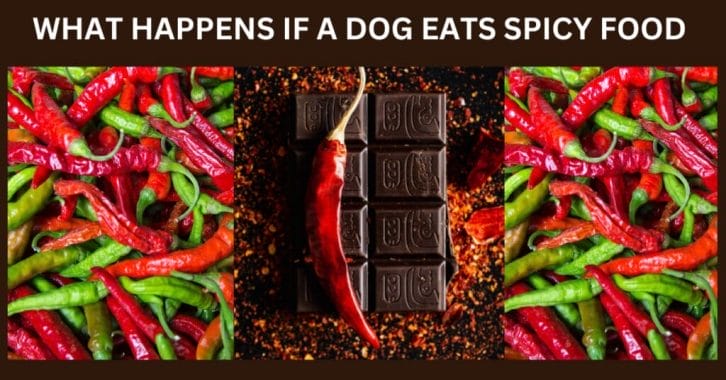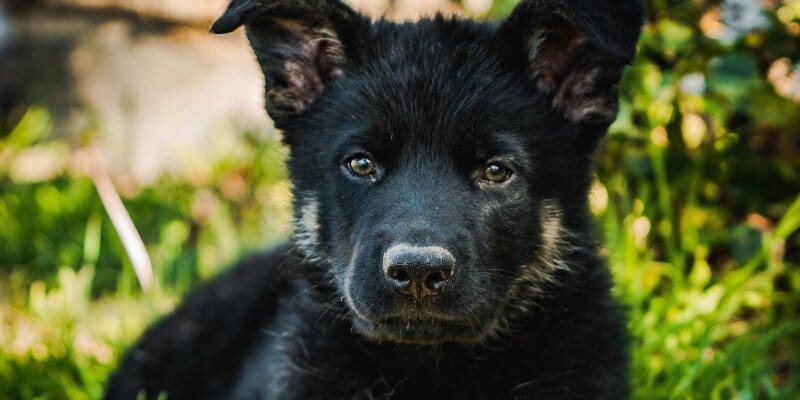What Happens If A Dog Eats Spicy Food

The Uncharted Territory What Happens If A Dog Eats Spicy Food
Introduction:
Dogs are known for their curious nature and insatiable appetites, making them prone to sampling whatever crosses their path, including spicy foods. While some dog owners may find it amusing to watch their Furry friends Explore different flavors, it’s crucial to understand that not all human foods are safe for dogs. In this blog post, we’ll delve into the potential consequences of a dog indulging in spicy fare and “what happens if a dog eats spicy” food explore why it’s essential to be cautious about what our canine companions consume.
The Canine Palate
Dogs have taste buds, but their palate differs significantly from ours. what happens if a dog eats spicy food While humans have a diverse range of taste receptors, dogs have fewer, and they are less sensitive to certain flavors, including spicy ones. This difference in taste perception means that dogs may not immediately register the heat of spicy foods, leading them to consume more than they should.
Why Is Spicy Food Bad for Dogs?
Potential Risks
Gastrointestinal Distress: Spicy food for dog often contain ingredients like chili peppers, which can irritate a dog’s stomach lining. This irritation may manifest as vomiting, diarrhea, or abdominal discomfort. In severe cases, it can even lead to inflammation of the gastrointestinal tract.
Allergic Reactions: Some dogs may be allergic to specific spices or ingredients commonly found in spicy food for dog . Allergic reactions can range from mild itching and redness to more severe symptoms like swelling and difficulty breathing, necessitating immediate veterinary attention.
Pancreatitis: Fatty and spicy food for dog can trigger pancreatitis in dogs. This condition involves inflammation of the pancreas, leading to symptoms such as vomiting, lethargy, and abdominal pain. Pancreatitis can be a serious and potentially life-threatening condition that requires prompt veterinary intervention.
Behavioral Changes: Discomfort caused by the ingestion of spicy food for dog may lead to changes in a dog’s behavior. They may become restless, anxious, or exhibit signs of discomfort. It’s crucial to monitor your dog closely for any unusual behavior after consuming spicy food.
How do dogs react to spicy food
Ever wondered if your dog can handle spicy food? Well, the answer is a bit different from us humans. Dogs have fewer taste buds, and they don’t really sense the heat from spicy things like we do. That’s because they lack taste receptors for the spicy compound called capsaicin. So, they won’t feel that burning sensation we get. But here’s the catch – every dog is different.
Some might not care about spicy foods at all, while others might show signs of discomfort like pawing at their mouths or avoiding the food. It’s essential to be mindful of your dog’s reactions and not give them too much spicy stuff. Keeping our furry friends happy and healthy means understanding their taste buds and treating them with care.
Dog eating spicy food
Feeding your dog spicy food might seem like a fun idea, but it’s important to know that dogs and spicy stuff don’t always mix well. Dogs don’t taste spicy things the way we do because they have fewer taste buds, and they lack the receptors for the heat in spicy foods.
While some dogs might not be bothered by it, others can react differently. If your pup starts pawing at their mouth, drooling, or avoiding the food, it’s a sign they might not enjoy the spiciness. It’s best to be cautious and not give them too much spicy food, as it can upset their stomach or cause discomfort. Keeping an eye on their reactions ensures that you’re making choices that keep your dog happy and healthy.
My Dog Ate Spicy Food What Do I Do?
What happens if a dog eats spicy food?
Observation is Key:
The first course of action after your dog devours chili is careful observation. Monitor for any signs of distress, such as vomiting, diarrhea, or changes in behavior. If the dog appears comfortable and displays no adverse reactions, it may not be an immediate cause for panic.
Consider the Ingredients:
Spicy food for dog ,Chili recipes vary widely, and the specific ingredients play a crucial role in determining the potential risks for your dog. If the chili contains onions, garlic, or other toxic components, a visit to the vet becomes more urgent. These ingredients can cause severe health issues and may necessitate immediate intervention.
Water and Comfort Measures:
If your dog has ingested chili and appears uncomfortable, offering plenty of fresh water can help soothe their digestive system. This simple measure may alleviate mild symptoms. However, if your dog shows signs of severe distress or if you’re unsure about the chili’s ingredients, consulting with a veterinarian is the safest course of action.
Monitor Closely:
Keep a close eye on your dog for any signs of distress, including vomiting, diarrhea, or changes in behavior.

Do I Need to Go to the Vet if My Dog Ate Chili?
“What happens if a dog eat spicy food” Dogs have an uncanny knack for getting into things they shouldn’t, and if your furry friend has managed to indulge in a bowl of chili, you might be wondering about the next steps. While it’s not uncommon for dogs to explore the world of human food, the presence of spicy food for dog ingredients in chili raises concerns about potential health risks.
While a dog indulging in a bit of spicy food for dog may not always necessitate an immediate vet visit, careful observation and understanding the ingredients are crucial. If your dog shows signs of discomfort or if the chili contains toxic elements, it’s wise to consult with a veterinarian to ensure your canine companion’s well-being. Remember, when in doubt, seeking professional guidance is the best recipe for a happy and healthy dog.
Can Dog Taste Spicy Food?
Can dogs taste spicy food? and what happens if a dog eats spicy food? In the grand tapestry of taste, dogs may not be the spice connoisseurs that humans are. Their limited sensitivity to capsaicin doesn’t prevent them from experiencing some level of discomfort when exposed to spicy food for dog . As responsible pet owners, it’s crucial to be mindful of the potential health risks associated with allowing our furry friends to indulge in spicy treats. While a small taste might not harm them, it’s wise to err on the side of caution and prioritize their overall well-being. After all, a happy and healthy pup is the ultimate spice of life!
Understanding Canine Taste Buds:
To comprehend how dogs experience taste, it’s crucial to acknowledge the differences between their taste buds and ours. While humans have around 9,000 taste buds, dogs have a significantly smaller number, ranging from 1,500 to 2,000. Despite this discrepancy, dogs possess taste receptors for the basic tastes: sweet, salty, sour, and bitter.
Limited Spicy Sensitivity:
While dogs may have a reduced ability to perceive spiciness compared to humans, it doesn’t mean they are entirely immune. Dogs can still experience some level of discomfort from the physical irritation caused by certain spices. Additionally, their heightened sensitivity to smell plays a crucial role in their overall perception of food.
Behavioral Responses to Spice:
Even though dogs may not taste spiciness in the same way humans do, they can still react behaviorally to the smell, texture, and overall experience of spicy foods. Some dogs may be drawn to the aroma, while others might be repelled by it. It’s essential for pet owners to observe their dogs’ reactions and make informed decisions about whether to introduce spicy elements into their diets.
Health Considerations:
Beyond taste, the consumption of spicy food for dog can have health implications for dogs. Ingredients commonly found in spicy dishes, such as onions and garlic, can be toxic to dogs. Additionally, the high fat content in some spicy foods may lead to digestive issues or more severe conditions like pancreatitis.
Conclusion:
We explore complete guide about “what happens if a dog eat spicy food” While it might be tempting to share a bite of your favorite spicy dish with your dog, it’s essential to prioritize their health and well-being. Understanding the potential risks and being proactive in preventing access to spicy food for dog can help ensure that your canine companion enjoys a happy and healthy life. When in doubt, always consult with your veterinarian for guidance tailored to your dog’s individual needs.
FAQs
what happens if a dog eats spicy food
What to do I do if my dog ate something spicy? If your dog has ingested something spicy food for dog , the first step is to observe for any signs of distress. Monitor for symptoms like vomiting, diarrhea, or changes in behavior. Providing access to fresh water can help alleviate mild discomfort. If severe symptoms persist or if you’re uncertain about the ingredients ingested, contacting your veterinarian promptly is essential.
Is spicy food bad for dogs?
Spicy food for dog can pose risks to dogs, as their digestive systems may not tolerate certain ingredients like chili peppers. Spices may cause gastrointestinal distress, discomfort, or more severe conditions. It’s advisable to avoid feeding your dog spicy foods and to be cautious about sharing any human snacks that contain such ingredients.
Can dogs feel pain from spicy food?
While dogs may not experience spiciness in the same way humans do due to fewer capsaicin receptors, they can still feel discomfort. Spicy food for dog may irritate their stomach lining, leading to pain and digestive issues. Pay attention to behavioral changes and seek veterinary advice if necessary.
What happens if a dog eats hot food?
If a dog consumes hot food, it can lead to various issues such as gastrointestinal distress, vomiting, diarrhea, and abdominal discomfort. The severity of the reaction depends on factors like the amount ingested and the specific ingredients. Seeking veterinary guidance is crucial for a proper assessment.
What foods are toxic to dogs?
Several foods are toxic to dogs, including chocolate, grapes, onions, garlic, and certain artificial sweeteners. These substances can lead to severe health issues or even be fatal. It’s essential to be aware of toxic foods and keep them out of your dog’s reach to ensure their safety.
What if my dog ate garlic?
Garlic, along with onions, contains compounds that can be toxic to dogs and may lead to symptoms such as vomiting, diarrhea, lethargy, and, in severe cases, damage to red blood cells. If your dog has ingested garlic, contact your veterinarian immediately for guidance on the appropriate steps to take.
Can dogs die from spicy food?
While death from spicy food for dog is rare, certain ingredients in spicy dishes, like onions or garlic, can be toxic to dogs and may lead to severe complications. It’s crucial to seek veterinary attention if you suspect your dog has ingested a toxic substance or is experiencing severe symptoms.
My dog ate spicy chicken – what should I do?
If your dog has consumed spicy chicken, monitor for signs of distress such as vomiting, diarrhea, or behavioral changes. Provide access to water to help ease any irritation. Contact your veterinarian to discuss the situation and follow their advice, especially if your dog shows severe symptoms or if you are unsure about the ingredients in the spicy chicken.
WRITTEN BY ANAM AHMED






